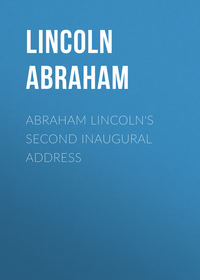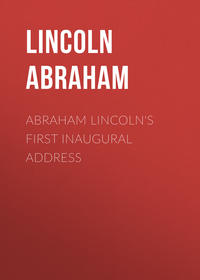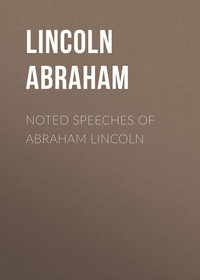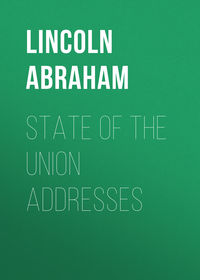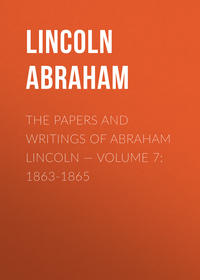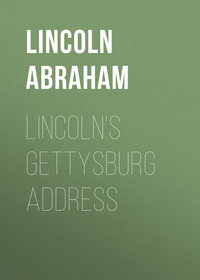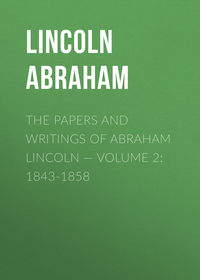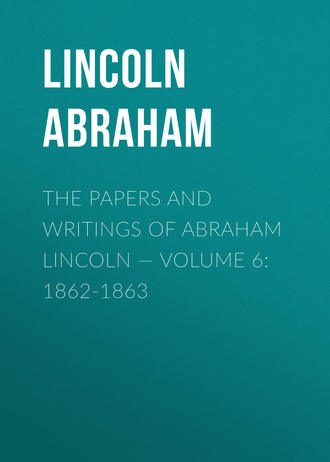 полная версия
полная версияThe Papers And Writings Of Abraham Lincoln — Volume 6: 1862-1863
The President directs me to say to you that there can be nothing to justify a panic at Fredericksburg. He expects you to maintain your position there as becomes a soldier and a general.
EDWIN M. STANTON, Secretary of War.
TELEGRAM TO GENERAL G. B. McCLELLAN
WASHINGTON CITY, D.C., June 1, 1862. 9.30MAJOR-GENERAL McCLELLAN:
You are probably engaged with the enemy. I suppose he made the attack. Stand well on your guard, hold all your ground, or yield any only inch by inch and in good order. This morning we merge General Wool's department into yours, giving you command of the whole, and sending General Dix to Port Monroe and General Wool to Fort McHenry. We also send General Sigel to report to you for duty.
A. LINCOLN.
TELEGRAM TO GENERAL G. B. McCLELLAN
WASHINGTON, June 3, 1862MAJOR-GENERAL McCLELLAN:
With these continuous rains I am very anxious about the Chickahominy so close in your rear and crossing your line of communication. Please look to it.
A. LINCOLN, President.
TELEGRAM TO GENERAL I. McDOWELL
WASHINGTON, June 3, 1862. 6.15 P.MMAJOR-GENERAL McDOWELL, Front Royal, Virginia:
Anxious to know whether Shields can head or flank Jackson. Please tell about where Shields and Jackson, respectively, are at the time this reaches you.
A. LINCOLN.
TELEGRAM TO GENERAL H. W. HALLECK
WASHINGTON, June 4, 1862MAJOR-GENERAL HALLECK, Corinth:
Your despatch of to-day to Secretary of War received. Thanks for the good news it brings.
Have you anything from Memphis or other parts of the Mississippi River? Please answer.
A. LINCOLN.
TELEGRAM TO GOVERNOR JOHNSON
[cipher.]WASHINGTON, June 4, 1862.
HON. ANDREW JOHNSON, Nashville, Tennessee:
Do you really wish to have control of the question of releasing rebel prisoners so far as they may be Tennesseeans? If you do, please tell us so. Your answer not to be made public.
A. LINCOLN.
TO GENERAL G. B. McCLELLAN
[Cipher.]WAR DEPARTMENT, WASHINGTON, D.C., June 7, 1862.
MAJOR-GENERAL McCLELLAN:
Your despatch about Chattanooga and Dalton was duly received and sent to General Halleck. I have just received the following answer from him:
We have Fort Pillow, Randolph, and Memphis.
A. LINCOLN.
TELEGRAM TO GENERAL H. W. HALLECK
WASHINGTON, June 8, 1862MAJOR-GENERAL HALLECK, Corinth, Mississippi:
We are changing one of the departmental lines, so as to give you all of Kentucky and Tennessee. In your movement upon Chattanooga I think it probable that you include some combination of the force near Cumberland Gap under General Morgan.
Do you?
A. LINCOLN.
TELEGRAM TO GENERAL N. P. BANKS
WASHINGTON, June 9, 1862MAJOR-GENERAL BANKS, Winchester:
We are arranging a general plan for the valley of the Shenandoah, and in accordance with this you will move your main force to the Shenandoah at or opposite Front Royal as soon as possible.
A. LINCOLN.
TELEGRAM TO GENERAL J. C. FREMONT
WASHINGTON, June 9, 1862MAJOR-GENERAL FREMONT:
Halt at Harrisonburg, pursuing Jackson no farther. Get your force well in hand and stand on the defensive, guarding against a movement of the enemy either back toward Strasburg or toward Franklin, and await further orders, which will soon be sent you.
A. LINCOLN.
TELEGRAM TO GOVERNOR JOHNSON
[Cipher.]WASHINGTON, June 9, 1862.
HON. ANDREW JOHNSON, Nashville, 'Tennessee:
Your despatch about seizing seventy rebels to exchange for a like number of Union men was duly received. I certainly do not disapprove the proposition.
A. LINCOLN.
TO GENERAL J. C. FREMONT. WASHINGTON, June 12, 1862
MAJOR-GENERAL FREMONT:Accounts, which we do not credit, represent that Jackson is largely reinforced and turning upon you. Get your forces well in hand and keep us well and frequently advised; and if you find yourself really pressed by a superior force of the enemy, fall back cautiously toward or to Winchester, and we will have in due time Banks in position to sustain you. Do not fall back upon Harrisonburg unless upon tolerably clear necessity. We understand Jackson is on the other side of the Shenandoah from you, and hence cannot in any event press you into any necessity of a precipitate withdrawal.
A. LINCOLN.
P.S. — Yours, preferring Mount Jackson to Harrisonburg, is just received. On this point use your discretion, remembering that our object is to give such protection as you can to western Virginia. Many thanks to yourself, officers, and men for the gallant battle of last Sunday. A. L.
MESSAGE TO CONGRESS
EXECUTIVE MANSION, WASHINGTON,June 13, 1862.
FELLOW-CITIZENS OF THE SENATE AND HOUSE OF REPRESENTATIVES: I herewith transmit a memorial addressed and presented to me in behalf of the State of New York in favor of enlarging the locks of the Erie and Oswego Canal. While I have not given nor have leisure to give the subject a careful examination, its great importance is obvious and unquestionable. The large amount of valuable statistical information which is collated and presented in the memorial will greatly facilitate the mature consideration of the subject, which I respectfully ask for it at your hands.
A. LINCOLN.
TO GENERAL J. C. FREMONT
WASHINGTON; June 13. 1862MAJOR-GENERAL FREMONT:
We cannot afford to keep your force and Banks's and McDowell's engaged in keeping Jackson south of Strasburg and Front Royal. You fought Jackson alone and worsted him. He can have no substantial reinforcements so long as a battle is pending at Richmond. Surely you and Banks in supporting distance are capable of keeping him from returning to Winchester. But if Sigel be sent forward to you, and McDowell (as he must) be put to other work, Jackson will break through at Front Royal again. He is already on the right side of the Shenandoah to do it, and on the wrong side of it to attack you. The orders already sent you and Banks place you and him in the proper positions for the work assigned you. Jackson cannot move his whole force on either of you before the other can learn of it and go to his assistance. He cannot divide his force, sending part against each of you, because he will be too weak for either. Please do as I directed in the order of the 8th and my despatch of yesterday, the 12th, and neither you nor Banks will be overwhelmed by Jackson. By proper scout lookouts, and beacons of smoke by day and fires by night you can always have timely notice of the enemy's approach. I know not as to you, but by some this has been too much neglected.
A. LINCOLN. TO GENERAL J. C. FREMONT
WAR DEPARTMENT, WASHINGTON CITY, D. C., June 15, 1862.
MAJOR-GENERAL FREMONT:
MY DEAR SIR: — Your letter of the 12th by Colonel Zagonyi is just received. In answer to the principal part of it, I repeat the substance of an order of the 8th and one or two telegraphic despatches sent you since.
We have no definite power of sending reinforcements; so that we are compelled rather to consider the proper disposal of the forces we have than of those we could wish to have. We may be able to send you some dribs by degrees, but I do not believe we can do more. As you alone beat Jackson last Sunday, I argue that you are stronger than he is to-day, unless he has been reinforced; and that he cannot have been materially reinforced, because such reinforcement could only have come from Richmond, and he is much more likely to go to Richmond than Richmond is to come to him. Neither is very likely. I think Jackson's game — his assigned work — now is to magnify the accounts of his numbers and reports of his movements, and thus by constant alarms keep three or four times as many of our troops away from Richmond as his own force amounts to. Thus he helps his friends at Richmond three or four times as much as if he were there. Our game is not to allow this. Accordingly, by the order of the 8th, I directed you to halt at Harrisonburg, rest your force, and get it well in hand, the objects being to guard against Jackson's returning by the same route to the upper Potomac over which you have just driven him out, and at the same time give some protection against a raid into West Virginia.
Already I have given you discretion to occupy Mount Jackson instead, if, on full consideration, you think best. I do not believe Jackson will attack you, but certainly he cannot attack you by surprise; and if he comes upon you in superior force, you have but to notify us, fall back cautiously, and Banks will join you in due time. But while we know not whether Jackson will move at all, or by what route, we cannot safely put you and Banks both on the Strasburg line, and leave no force on the Front Royal line — the very line upon which he prosecuted his late raid. The true policy is to place one of you on one line and the other on the other in such positions that you can unite once you actually find Jackson moving upon it. And this is precisely what we are doing. This protects that part of our frontier, so to speak, and liberates McDowell to go to the assistance of McClellan. I have arranged this, and am very unwilling to have it deranged. While you have only asked for Sigel, I have spoken only of Banks, and this because Sigel's force is now the principal part of Bank's force.
About transferring General Schenck's commands, the purchase of supplies, and the promotion and appointment of officers, mentioned in your letter, I will consult with the Secretary of War to-morrow.
Yours truly,
A. LINCOLN.
TO GENERAL J. C. FREMONT
WASHINGTON, June 16, 1862MAJOR-GENERAL FREMONT, Mount Jackson, Virginia:
Your despatch of yesterday, reminding me of a supposed understanding that I would furnish you a corps of 35,000 men, and asking of me the "fulfilment of this understanding," is received. I am ready to come to a fair settlement of accounts with you on the fulfilment of understandings.
Early in March last, when I assigned you to the command of the Mountain Department, I did tell you I would give you all the force I could, and that I hoped to make it reach 35,000. You at the same time told me that within a reasonable time you would seize the railroad at or east of Knoxville, Tenn., if you could. There was then in the department a force supposed to be 25,000, the exact number as well known to you as to me. After looking about two or three days, you called and distinctly told me that if I would add the Blenker division to the force already in the department, you would undertake the job. The Blenker division contained 10,000, and at the expense of great dissatisfaction to General McClellan I took it from his army and gave it to you. My promise was literally fulfilled. I have given you all I could, and I have given you very nearly, if not quite, 35,000.
Now for yours. On the 23d of May, largely over two months afterward, you were at Franklin, Va., not within 300 miles of Knoxville, nor within 80 miles of any part of the railroad east of it, and not moving forward, but telegraphing here that you could not move for lack of everything. Now, do not misunderstand me. I do not say you have not done all you could. I presume you met unexpected difficulties; and I beg you to believe that as surely as you have done your best, so have I. I have not the power now to fill up your Corps to 35,000. I am not demanding of you to do the work of 35,000. I am only asking of you to stand cautiously on the defensive, get your force in order, and give such protection as you can to the valley of the Shenandoah and to western Virginia.
Have you received the orders, and will you act upon them?
A. LINCOLN.
TO GENERAL C. SCHURZ
WASHINGTON, June 16, 1862BRIGADIER-GENERAL SCHURZ, Mount Jackson, Virginia:
Your long letter is received. The information you give is valuable. You say it is fortunate that Fremont did not intercept Jackson; that Jackson had the superior force, and would have overwhelmed him. If this is so, how happened it that Fremont fairly fought and routed him on the 8th? Or is the account that he did fight and rout him false and fabricated? Both General Fremont and you speak of Jackson having beaten Shields. By our accounts he did not beat Shields. He had no engagement with Shields. He did meet and drive back with disaster about 2000 of Shields's advance till they were met by an additional brigade of Shields's, when Jackson himself turned and retreated. Shields himself and more than half his force were not nearer than twenty miles to any of it.
A. LINCOLN.
TELEGRAM TO GENERAL H. W. HALLECK
WASHINGTON, June 18, 1862MAJOR-GENERAL HALLECK, Corinth, Mississippi:
It would be of both interest and value to us here to know how the expedition toward East Tennessee is progressing, if in your judgment you can give us the information with safety.
A. LINCOLN.
TELEGRAM TO GENERAL G. B. McCLELLAN
WAR DEPARTMENT, WASHINGTON, D. C., June 18, 1862MAJOR-GENERAL McCLELLAN:
Yours of to-day, making it probable that Jackson has been reinforced by about 10,000 from Richmond, is corroborated by a despatch from General King at Fredericksburg, saying a Frenchman, just arrived from Richmond by way of Gordonsville, met 10,000 to 15,000 passing through the latter place to join Jackson.
If this is true, it is as good as a reinforcement to you of an equal force. I could better dispose of things if I could know about what day you can attack Richmond, and would be glad to be informed, if you think you can inform me with safety.
A. LINCOLN.
TELEGRAM TO GENERAL G. B. McCLELLAN
WASHINGTON, JUNE 19, 1862MAJOR-GENERAL McCLELLAN:
Yours of last night just received, and for which I thank you.
If large reinforcements are going from Richmond to Jackson, it proves one of two things: either they are very strong at Richmond, or do not mean to defend the place desperately.
On reflection, I do not see how reinforcements from Richmond to Jackson could be in Gordonsville, as reported by the Frenchman and your deserters. Have not all been sent to deceive?
A. LINCOLN.
TELEGRAM TO GENERAL G. B. McCLELLAN
WAR DEPARTMENT, WASHINGTON, June 20, 1862MAJOR-GENERAL McCLELLAN:
In regard to the contemplated execution of Captains Spriggs and Triplett the government has no information whatever, but will inquire and advise you.
A. LINCOLN.
TELEGRAM TO GENERAL G. B. McCLELLAN
WASHINGTON CITY, June 20, 1862MAJOR-GENERAL McCLELLAN:
We have this morning sent you a despatch of General Sigel corroborative of the proposition that Jackson is being reinforced from Richmond. This may be reality, and yet may only be contrivance for deception, and to determine which is perplexing. If we knew it was not true, we could send you some more force; but as the case stands we do not think we safely can. Still, we will watch the signs and do so if possible.
In regard to a contemplated execution of Captains Spriggs and Triplett the government has no information whatever, but will inquire and advise you.
A. LINCOLN.
TELEGRAM TO GENERAL G. B. McCLELLAN
WASHINGTON, June 21 1862 6 PMMAJOR-GENERAL GEORGE B. McCLELLAN:
Your despatch of yesterday (2 P. M.) was received this morning. If it would not divert too much of your time and attention from the army under your immediate command, I would be glad to have your views as to the present state of military affairs throughout the whole country, as you say you would be glad to give them. I would rather it should be by letter than by telegraph, because of the better chance of secrecy. As to the numbers and positions of the troops not under your command in Virginia and elsewhere, even if I could do it with accuracy, which I cannot, I would rather not transmit either by telegraph or by letter, because of the chances of its reaching the enemy. I would be very glad to talk with you, but you cannot leave your camp, and I cannot well leave here.
A. LINCOLN, President
TELEGRAM TO GENERAL N. P. BANKS
WAR DEPARTMENT, June 22, 1862MAJOR-GENERAL BANKS, Middletown:
I am very glad you are looking well to the west for a movement of the enemy in that direction. You know my anxiety on that point.
All was quiet at General McClellan's headquarters at two o'clock to-day.
A. LINCOLN.
TREATY WITH MEXICO
MESSAGE TO THE SENATEWASHINGTON, June 23, 1862.
TO THE SENATE OF THE UNITED STATES:
On the 7th day of December, 1861, I submitted to the Senate the project of a treaty between the United States and Mexico which had been proposed to me by Mr. Corwin, our minister to Mexico, and respectfully requested the advice of the Senate thereupon.
On the 25th day of February last a resolution was adopted by the Senate to the effect:
"That it is not advisable to negotiate a treaty that will require the United States to assume any portion of the principal or interest of the debt of Mexico, or that will require the concurrence of European powers."
This resolution having been duly communicated to me, notice thereof was immediately given by the Secretary of State to Mr. Corwin, and he was informed that he was to consider his instructions upon the subject referred to modified by this resolution and would govern his course accordingly. That despatch failed to reach Mr. Corwin, by reason of the disturbed condition of Mexico, until a very recent date, Mr. Corwin being without instructions, or thus practically left without instructions, to negotiate further with Mexico.
In view of the very important events Occurring there, he has thought that the interests of the United States would be promoted by the conclusion of two treaties which should provide for a loan to that republic. He has therefore signed such treaties, and they having been duly ratified by the Government of Mexico, he has transmitted them to me for my consideration. The action of the Senate is of course conclusive against an acceptance of the treaties On my part. I have, nevertheless, thought it just to our excellent minister in Mexico and respectful to the Government of that republic to lay the treaties before the Senate, together with the correspondence which has occurred in relation to them. In performing this duty I have only to add that the importance of the subject thus submitted to the Senate, can not be over estimated, and I shall cheerfully receive and consider with the highest respect any further advice the Senate may think proper to give upon the subject.
A. LINCOLN.
VETO OF A CURRENCY BILL
MESSAGE TO THE SENATE, JUNE 23, 1862TO THE SENATE OF THE UNITED STATES:
The bill which has passed the House of Representatives and the Senate, entitled "An act to repeal that part of an act of Congress which prohibits the circulation of bank-notes of a less denomination than five dollars in the District of Columbia," has received my attentive consideration, and I now return it to the Senate, in which it originated, with the following objections:
1. The bill proposes to repeal the existing legislation prohibiting the circulation of bank-notes of a less denomination than five dollars within the District of Columbia, without permitting the issuing of such bills by banks not now legally authorized to issue them. In my judgment, it will be found impracticable, in the present condition of the currency, to make such a discrimination. The banks have generally suspended specie payments, and a legal sanction given to the circulation of the irredeemable notes of one class of them will almost certainly be so extended, in practical operation, as to include those of all classes, whether authorized or unauthorized. If this view be correct, the currency of the District, should this act become a law, will certainly and greatly deteriorate, to the serious injury of honest trade and honest labor.
2. This bill seems to contemplate no end which cannot be otherwise more certainly and beneficially attained. During the existing war it is peculiarly the duty of the National Government to secure to the people a sound circulating medium. This duty has been, under existing circumstances, satisfactorily performed, in part at least, by authorizing the issue of United States notes, receivable for all government dues except customs, and made a legal tender for all debts, public and private, except interest on public debt. The object of the bill submitted to me — namely, that of providing a small note currency during the present suspension — can be fully accomplished by authorizing the issue, as part of any new emission of United States notes made necessary by the circumstances of the country, of notes of a similar character, but of less denomination than five dollars. Such an issue would answer all the beneficial purposes of the bill, would save a considerable amount to the treasury in interest, would greatly facilitate payments to soldiers and other creditors of small sums, and would furnish; to the people a currency as safe as their own government.
Entertaining these objections to the bill, I feel myself constrained to withhold from it my approval and return it for the further consideration and action of Congress.
A. LINCOLN
SPEECH AT JERSEY CITY, JUNE 24, 1862
When birds and animals are looked at through a fog, they are seen to disadvantage, and so it might be with you if I were to attempt to tell you why I went to see General Scott. I can only say that my visit to West Point did not have the importance which has been attached to it; but it concerned matters that you understand quite as well as if I were to tell you all about them. Now, I can only remark that it had nothing whatever to do with making or unmaking any general in the country. The Secretary of War, you know, holds a pretty tight rein on the press, so that they shall not tell more than they ought to; and I 'm afraid that if I blab too much, he might draw a tight rein on me.
TO GENERAL G. B. McCLELLAN
WASHINGTON, June 26, 1862MAJOR-GENERAL McCLELLAN:
Your three despatches of yesterday in relation to the affair, ending with the statement that you completely succeeded in making your point, are very gratifying.
The later one of 6.15 P.M., suggesting the probability of your being overwhelmed by two hundred thousand, and talking of where the responsibility will belong, pains me very much. I give you all I can, and act on the presumption that you will do the best you can with what you have, while you continue, ungenerously I think, to assume that I could give you more if I would. I have omitted, and shall omit, no opportunity to send you reinforcements whenever I possibly can.


